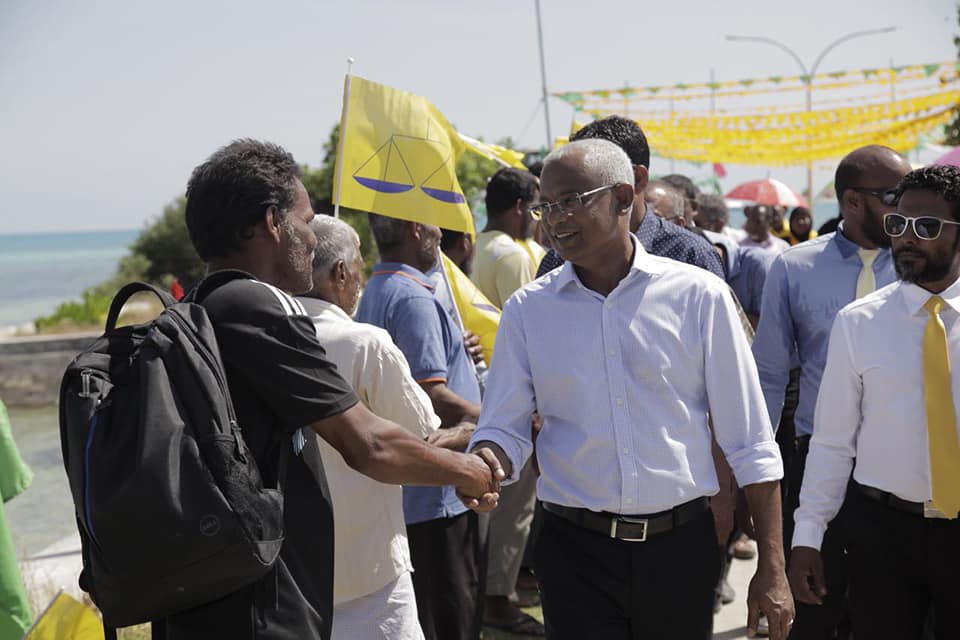Maldives delivers stunning electoral mandate
April 9, 2019 | Expert Insights

Maldives gives an overwhelming majority to incumbent President Solih’s MDP, in a rebuke of authoritarianism, China’s policies in the archipelago and nationalist politics.
Background
The Maldives, an island nation in the Indian Ocean, after a period of political instability and strife, has recently engaged in electoral practices that attempt to ensure the democratic credentials of the nation. President Ibrahim Mohammed Solih defeated former president Yameen Abdul Gayoom in 2018, in a rejection of Mr. Yameen’s curtailment of freedoms of speech and authoritarian tendencies. President Solih’s Maldivian Democratic Party (MDP) is seeking a majority parliamentary government in Maldives 87 member parliament in order to capture the entirety of the Maldivian mandate. Aligned to Mr. Solih is the former president, Mohamed Nasheed, who was the MDP’s original choice to run for Maldives’ highest-executive office but was sentenced to prison under Mr. Yameen.
Analysis
Provisional results in the Maldivian parliamentary elections indicate that President Solih’s MDP is likely to gain a landslide mandate. Mr. Solih had promised electoral reforms, an effort to stymie corruption and an end to political interference in courts, police and bureaucracy when he gained the presidential mandate in 2018. Mr. Solih had gained this mandate when opposition politicians had unified against the then president, Mr. Yameen. The MDP-led coalition maintained its hold on parliament with support from coalition partners, including the Jumhooree Party. However, Mr. Solih failed to meet his electoral promises when the coalition fragmented and he could no longer ensure parliamentary support for all his initiatives.
The results of the parliamentary elections seem to indicate that Mr. Solih and the charismatic former president, Mohamed Nasheed’s party, the MDP, will now seek to navigate the country’s substantial debts and tackle corruption allegations relating to the accrual of these debts. Mr. Yameen has long maintained a pro-China policy, including in the accrual of recent debt. The archipelago has long been caught in a battle for influence between India and China. India’s historical position as the Maldives’ political benefactor had been challenged by China’s investment of millions of dollars during Mr. Yameen’s regime as a part of the Belt and Road Initiative. The MDP has sought to actively pinpoint the nature of the archipelago’s debt to China, which it believes could run as high as US$3 billion. Such a momentous amount of debt for a small, isolated nation could sink the economy.
The Jumhooree Party and Mr. Yameen’s Progressive Party of Maldives (PPM) have both campaigned on a nationalist platform, stoking religious sentiment in an effort to garner votes to dent the mandate of the MDP. Mr. Yameen had spent over a month in custody over a scandal that accused him of syphoning money from the Maldivian tourism board. He was released in time to allow for campaigning and has adamantly denied the charges. This extended time in custody, in conjunction with continued accusals of corruption has dogged the PPM, likely donating to their electoral result. The Jumhooree Party, which had been conspicuously absent during votes to begin an investigation into malpractice by the previous government, can now no longer hinder efforts by the MDP to stem corruption.
In terms of geopolitics, it appears that the tussle for influence between China and India has largely been settled with the complete ascendancy of the MDP. However, China continues to exercise significant economic interests in the archipelago, which is likely to continue to cause India some concern. Nonetheless, the hesitancy of the current crop of Maldivian authorities to engage further with China seems to have driven home concerns over China’s intentions in the island nation. The cognisance is a normatively important step in domestic politics, as well as towards India’s interests. China is likely to take on an apolitical standpoint, deny corruption and ulterior motives, by making overt displays of support for the newly mandated Maldivian government.
Assessment
Our assessment is that Mr. Solih’s victory is an important normative achievement for Maldivian democracy, which only began its tumultuous journey in 2008. We believe that the stage is set for the return of Mohamed Nasheed to the centre of Maldivian politics, although it is unlikely that Mr. Solih is sidelined. We believe that Maldivian authorities will continue their scepticism of China’s intentions in the region, although their efforts are likely to be bolstered by the MDP’s commanding presence in parliament. It is likely that Mr. Yameen faces further corruption charges, especially related to China’s Belt and Road initiative (BRI). We believe that should any discrepancies come to light, it may prove to be a momentous revelation of China’s potential nefarious intentions with the BRI. We believe it likely that the Maldives reengages with India on a deeper level, although much is dependent on the nature of India’s new government once its own general elections are completed. We believe that now that the political mandate has been resoundingly delivered to the MDP, it is likely that pertinent issues facing the nation are dealt with in a concerted manner, with a special focus on corruption, health, climate change and human rights issues.
Image Courtesy: Asimoosa [CC BY-SA 4.0 (https://creativecommons.org/licenses/by-sa/4.0)]
Read more:








Comments